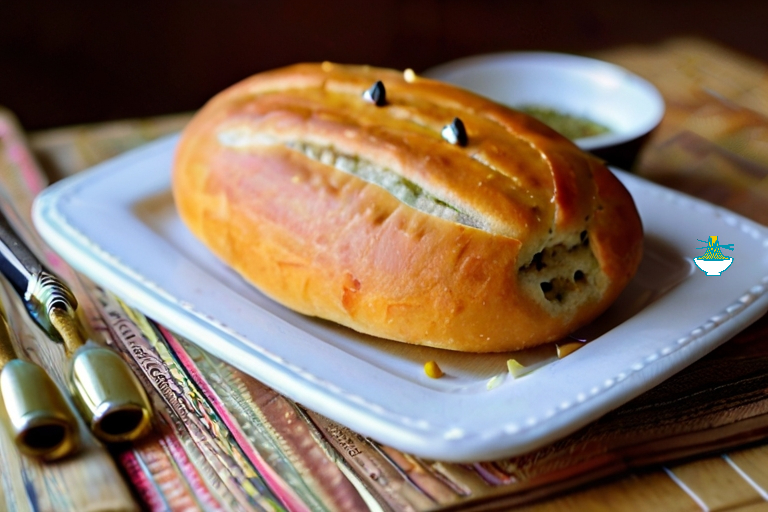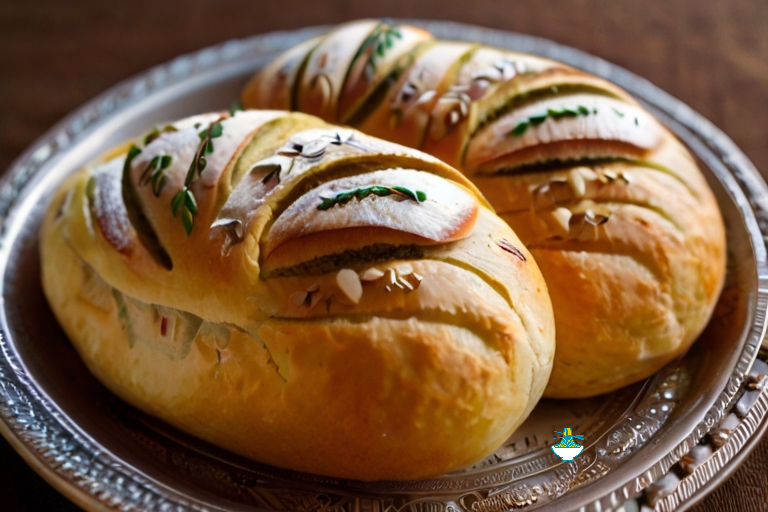Indulge in the rich cultural heritage of Eritrea with our traditional Himbasha. This beloved Eritrean bread, often enjoyed during festive occasions and family gatherings, is a symbol of community and celebration. Made with a blend of wheat flour, yeast, and aromatic spices such as cardamom and cloves, each bite of Himbasha offers a delightful explosion of flavors. Its unique braided design not only enhances its visual appeal but also adds to its texture, resulting in a perfect balance of softness and chewiness. Whether paired with a cup of spicy Eritrean coffee or enjoyed on its own, our authentic Himbasha promises to transport you to the vibrant streets of Eritrea, where the aroma of freshly baked bread fills the air and the warmth of hospitality knows no bounds.
Here's a recipe for Eritrean Himbasha:
Ingredients:
- 4 cups all-purpose flour
- 1 cup warm water
- 1/2 cup milk
- 1/4 cup vegetable oil
- 1/2 cup sugar
- 1 packet (2 1/4 teaspoons) active dry yeast
- 1 teaspoon ground cardamom
- 1/2 teaspoon ground cloves
- 1/2 teaspoon salt
- Optional: sesame seeds for topping

Instructions:
1- In a small bowl, dissolve the sugar in warm water. Sprinkle the yeast over the water and let it sit for about 5-10 minutes until it becomes frothy.
2- In a large mixing bowl, combine the flour, cardamom, cloves, and salt.
3- Make a well in the center of the flour mixture and pour in the yeast mixture, milk, and vegetable oil.
4- Using a wooden spoon or your hands, mix the ingredients together until a dough forms.
5- Turn the dough out onto a lightly floured surface and knead it for about 5-7 minutes until it becomes smooth and elastic.
6- Place the dough in a greased bowl, cover it with a clean kitchen towel, and let it rise in a warm place for about 1-2 hours or until it doubles in size.
7- Preheat your oven to 350°F (175°C). Line a baking sheet with parchment paper.
8- Punch down the risen dough and divide it into equal portions. Shape each portion into a round or oval loaf.
9- Place the loaves onto the prepared baking sheet, leaving some space between them. Optional: Brush the tops with milk and sprinkle with sesame seeds for added flavor and decoration.
10- Bake the Himbasha in the preheated oven for 20-25 minutes or until they turn golden brown and sound hollow when tapped on the bottom.
11- Remove the Himbasha from the oven and let them cool on a wire rack before serving.
Enjoy your homemade Eritrean Himbasha as a sweet and soft bread flavored with aromatic spices like cardamom, perfect for special occasions and celebrations!
Nutritional Values:
Here are approximate nutritional values for the ingredients used in the Eritrean Himbasha recipe, based on standard serving sizes:
All-purpose flour (1 cup, 120g):
- Calories: 455
- Protein: 12.9g
- Fat: 1.2g
- Carbohydrates: 95g
- Fiber: 3.4g
- Sugar: 0.4g
benefits:Provides carbohydrates for energy, contains some protein for muscle repair and growth, and offers fiber for digestive health.
Water (1 cup, 237g):
- Calories: 0
- Protein: 0g
- Fat: 0g
- Carbohydrates: 0g
benefits:Essential for hydration, helps regulate body temperature, aids in digestion, and supports nutrient absorption.
Milk, whole (1 cup, 244g):
- Calories: 148
- Protein: 7.7g
- Fat: 7.9g
- Carbohydrates: 11.7g
- Sugar: 12.8g
benefits:Excellent source of calcium for bone health, contains protein for muscle maintenance, provides vitamins and minerals such as vitamin D and potassium.
Vegetable oil (1/4 cup, 48g):
- Calories: 488
- Protein: 0g
- Fat: 54g
- Carbohydrates: 0g
benefits:Supplies healthy fats for energy, supports cell function, and helps in the absorption of fat-soluble vitamins.
Sugar (1/2 cup, 100g):
- Calories: 387
- Protein: 0g
- Fat: 0g
- Carbohydrates: 99.8g
- Sugar: 99.8g
benefits:Provides a quick source of energy, though excessive consumption should be moderated to avoid health issues like diabetes and obesity.
Active dry yeast (1 packet, 7g):
- Calories: 23
- Protein: 3g
- Fat: 0.4g
- Carbohydrates: 2.8g
- Fiber: 2.3g
- Sugar: 0.1g
benefits:Acts as a leavening agent, helping the dough rise by fermenting sugars and producing carbon dioxide gas, which creates air pockets in the bread.
Ground cardamom (1 teaspoon, 2g):
- Calories: 6
- Protein: 0.2g
- Fat: 0.3g
- Carbohydrates: 1.4g
- Fiber: 0.6g
- Sugar: 0g
benefits:Adds flavor and aroma to the bread, may aid digestion, and contains antioxidants that may have health benefits.
Ground cloves (1/2 teaspoon, 1g):
- Calories: 2
- Protein: 0g
- Fat: 0.1g
- Carbohydrates: 0.7g
- Fiber: 0.4g
- Sugar: 0g
benefits:Imparts a warm, spicy flavor to the bread and contains compounds with potential antioxidant and anti-inflammatory properties.
Salt (1/2 teaspoon, 3g):
- Calories: 0
- Protein: 0g
- Fat: 0g
- Carbohydrates: 0g
benefits:Enhances flavor, helps regulate fluid balance in the body, and is essential for nerve and muscle function. However, excessive salt consumption should be avoided to maintain overall health.
Please note that these values are approximate and may vary based on factors such as brand, preparation methods, and specific ingredients used.


Comments